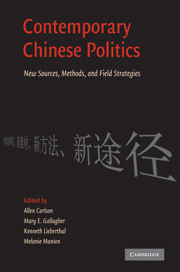Book contents
- Frontmatter
- Contents
- Tables and Figures
- Contributors
- Abbreviations
- Introduction
- Part I Sources
- Part II Qualitative Methods
- Part III Survey Methods
- 10 A Survey of Survey Research on Chinese Politics
- 11 Surveying Prospects for Political Change
- 12 Using Clustered Spatial Data to Study Diffusion
- 13 Measuring Change and Stability over a Decade in the Beijing Area Study
- 14 Quantitative Research and Issues of Political Sensitivity in Rural China
- Reflections on the Evolution of the China Field in Political Science
- Glossary
- References
- Index
14 - Quantitative Research and Issues of Political Sensitivity in Rural China
Published online by Cambridge University Press: 05 June 2012
- Frontmatter
- Contents
- Tables and Figures
- Contributors
- Abbreviations
- Introduction
- Part I Sources
- Part II Qualitative Methods
- Part III Survey Methods
- 10 A Survey of Survey Research on Chinese Politics
- 11 Surveying Prospects for Political Change
- 12 Using Clustered Spatial Data to Study Diffusion
- 13 Measuring Change and Stability over a Decade in the Beijing Area Study
- 14 Quantitative Research and Issues of Political Sensitivity in Rural China
- Reflections on the Evolution of the China Field in Political Science
- Glossary
- References
- Index
Summary
Political sensitivity is always a challenge for the scholar doing fieldwork in nondemocratic and transitional systems, especially when doing surveys and quantitative research. Not only are more research topics likely to be politically sensitive in these systems, but in trying to collect precise and unbiased data to give us a quantitative description of a population, we are sometimes doing exactly what the government – and sometimes certain members of that population – would like to prevent. In this chapter, I discuss some of the methodological and ethical issues that face researchers working in these contexts and describe strategies for dealing with these issues. I argue that in these contexts a “socially embedded” approach to survey research that carefully attends to the social relationships inherent in the survey research process can help alleviate problems of political sensitivity, protect participants and researchers in the survey research process, and maximize data quality.
For this chapter I draw on my experience conducting a village-level survey on village conditions of officials in 316 villages in rural China in 2001 as part of the twenty months of fieldwork I conducted for my doctoral dissertation and book, Accountability without Democracy: Solidary Groups and Public Goods Provision in Rural China (2007a). Unlike an individual-level opinion survey of the mass public, this survey focused on village-level institutions and outcomes and interviewed one or more village officials in each village as informants on their village’s economy, politics, and society.
- Type
- Chapter
- Information
- Contemporary Chinese PoliticsNew Sources, Methods, and Field Strategies, pp. 246 - 265Publisher: Cambridge University PressPrint publication year: 2010
- 18
- Cited by

